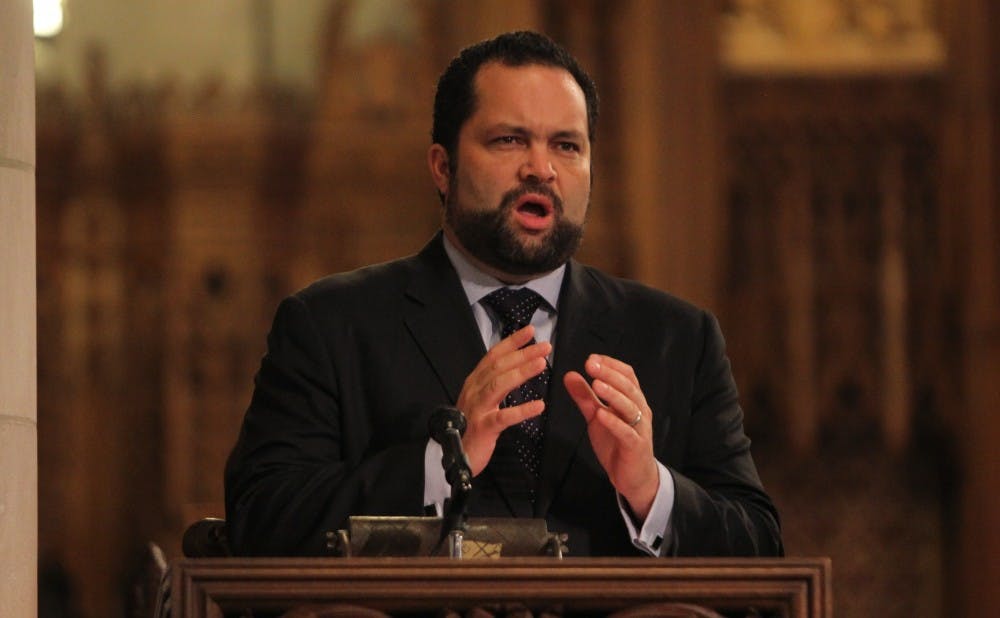History is perilously close to repeating itself in the struggle for civil rights in North Carolina, said Benjamin Jealous, former president of the National Association for the Advancement of Colored People.
Duke held its annual Martin Luther King Jr. commemoration service in the Chapel Sunday afternoon, marking a point more than 50 years after King gave his famous 1963 “I Have a Dream” speech in Washington, D.C. Students and faculty heard from Jealous and several other speakers including President Richard Brodhead, Durham Mayor Pro Tempore Cora Cole-McFadden and Black Student Alliance President Marcus Benning, a senior.
Weaving the theme of the service—“50 Years Backwards or Forward?”—into his keynote statement, Jealous connected the historical landmark to the issues now occupying the NAACP’s priorities in North Carolina.
“There’s already a silent majority in this state that believes in justice and believes in rights and believes what’s happening at the Raleigh State Capitol is taking us back, when we need to go forward,” Jealous said.
He referenced the Moral Monday protest movement in response to legislative actions taken by the N.C. General Assembly, which has since spread to multiple other states in support of various causes.
“A small group of people have hijacked our state governments,” Jealous said. “They’re sending us backwards fast. They’re setting up fights that seem too familiar.”
Benning pressed on similar points, referring back to the examples set by the leaders of the civil rights movement that should be replicated by those fighting for equal protection again today. He quoted Maya Angelou’s poem “I Know Why the Caged Bird Sings” at the chapel podium, not far from where Angelou herself has spoken on several occasions.
“Our activism cannot be one-dimensional,” he said. “It must be multifaceted, intersectional and collaborative.”
Brodhead recounted the history of black students at the University in his greetings to the audience of several hundred people. He spoke of the recent 50th anniversary of integration, which celebrated the first five black undergraduate students who started at Duke a few weeks after King made his “I Have a Dream” speech. Although the history of integration has been celebrated at Duke in recent months, Brodhead urged the audience to continue to draw King’s legacy and impact closer to them.
“That was not the work of one day,” Brodhead said. “We’ve come a long ways but we’re not at the end.… We can’t give a good education to anyone unless we open our doors to everyone.”
In his speech, Jealous recalled memories of his time working across the South with the NAACP to keep three black colleges open, fighting discrimination in the judicial system and reporting for the Jackson Advocate, a Mississippi newspaper. He urged the audience to take action in reforming thought and protesting injustices like those he said are occurring in the N.C. legislature.
“Commit yourself to finishing that before you die,” he said.
Jealous was also a Rhodes Scholar and served as the founding director of Amnesty International U.S. Human Rights program.
In her introduction of Jealous, Duke NAACP President Britany Thompson, a senior, noted the contributions Jealous has made to the NAACP as an organization. For example, he drastically expanded the organization’s online presence to include 500,000 additional online activists and also reached more donors.
The recessional and processional were led by the Collage Dance Company, who provided rhythm, chanting and singing in addition to African dances performed down the aisles of the chapel. The 100 Men in Black Choir also provided two musical interludes during the service. Judith Ruderman, former vice provost for academic and administrative services, sang the “May the Words of My Mouth” psalm after the processional.
“May the words of my mouth and the thoughts of my heart be acceptable in your sight,” she sang.
Other speakers included Rachel Fraade and Nourhan Elsayed, representatives of the Jewish Student Union and Muslim Student Association, respectively, who lit a candle representing peace, hope and justice. Dean of the Chapel Rev. Luke Powery gave the invocation and Duke Hospital President Kevin Sowers also spoke.
Sowers noted that giving students and employees Monday off to participate in service honors the original intent of MLK Day. Service to society, he said, is one of the defining legacies of the founders that persists to this day.
Jealous said the University is not only instrumental in maintaining the tradition of service, but also empowering students to better the world by expanding their skills and knowledge.
“Once you decide to commit, the task proves easier than you thought,” he said.
Get The Chronicle straight to your inbox
Signup for our weekly newsletter. Cancel at any time.

